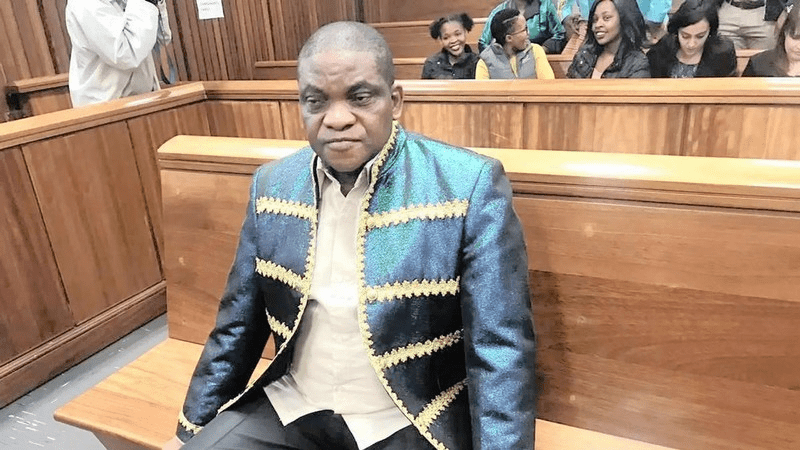Controversial Nigerian Pastor Timothy Omotoso, who has faced a protracted rape and human trafficking trial that stretched across more than seven years, is now a free man. Alongside him, his two co-accused, Zukiswa Sitho, 42, and Lusanda Sulani, 35, were also acquitted of all charges.
In an emotional moment following the verdict delivered by Judge Irma Schoeman in the Gqeberha High Court, the trio fell to their knees in prayer, expressing relief and gratitude. Judge Schoeman stated that the prosecution had failed to establish the guilt of the accused beyond a reasonable doubt, a standard that is critical in criminal trials.
The reaction to the verdict was divided: while Omotoso’s supporters and church congregants celebrated what they viewed as a victory for justice, others—most notably those who believed in his guilt—were left in shock and disbelief, grappling with the reality of the court’s decision.
In a comprehensive judgment, Judge Schoeman addressed not only the evidence presented during the trial but also highlighted the unethical conduct of the State prosecutors. The defence team, led by advocate Peter Daubermann, had accused the former prosecution team, which included State Advocates Nceba Ntelwa and Ismat Cerfontein, of unethical practices and corruption. Daubermann alleged that the prosecutors suborned witnesses to commit perjury, attempting to mislead the court by presenting false evidence in a desperate bid to secure a conviction at any cost.
Schoeman’s judgment highlights various missteps made by the prosecution team. One notable error involved the service of an initial indictment to the accused, which was subsequently replaced by a second indictment without informing either the court or the defence—a mistake that only became apparent well into the proceedings. This disregard for proper protocol raised serious concerns about the integrity of the prosecution’s case.
Further complicating matters, Cerfontein discovered inconsistencies between witness statements and their accounts during consultations. Despite recognizing these discrepancies, instead of rectifying the situation through written affidavits, Ntelwa advised that witnesses should be persuaded to adhere to their original police statements to avoid potential postponements. When Cerfontein reported this unethical suggestion to their superiors, the expected sanctions against Ntelwa did not occur. Instead, an amended indictment was introduced that included changes based on the inconsistent witness statements, highlighting a troubling lack of accountability within the prosecution.
Schoeman pointed out that the irregularities in the prosecutors’ handling of the case were extensive. There were cancellations of important witness consultations without justification, and it appeared that Ntelwa was determined to suppress any witness testimony that might diverge from their original statements. This suppression could likely have impacted the overall fairness of the trial.
The case took a troubling turn when Cheryl Zondi, one of the complainants, voiced her concerns in a letter addressed to National Director of Public Prosecutions, Shamiela Batohi, expressing her discontent with Ntelwa’s reappointment to the prosecution team. This letter, though forwarded to the Acting Director of Public Prosecutions in Makhanda, Advocate Nelly Sakata, did not result in action, further raising alarms about prosecutorial standards and ethics.
Read also: Tinubu leaves for Paris on 14-day working visit
The situation was exacerbated when Ntelwa was observed speaking with a witness during her cross-examination—an act that raises serious ethical questions. While he claimed his intent was merely to comfort the witness, the lack of transparency in his actions led Schoeman to ponder whether it was indeed innocent or part of a more insidious strategy. Such behavior raises substantial ethical concerns, particularly in light of the professional conduct codes established by the National Bar Council of South Africa.
Additionally, unredacted emails between the prosecutors revealed discrepancies in Ntelwa’s claims regarding his knowledge of contradictory witness statements, indicating he had indeed been informed by Cerfontein. This revelation formed the basis for a subsequent application by Daubermann for a mistrial, highlighting the gravity of the prosecution’s failures.
In one particularly egregious instance cited in court, Ntelwa admitted in an affidavit that he was unaware that digital penetration of genitalia constituted rape—a statement that raised eyebrows given his fourteen years of experience handling rape cases. Judge Schoeman condemned this lack of basic legal understanding as either an indication of extreme incompetence or a deliberate act of dishonesty.
Furthermore, the establishment of a WhatsApp group that included all the complainants, which Ntelwa described as a logistical necessity, drew scrutiny, as it raised questions about the safeguarding of witness integrity and the potential for witness tampering.






